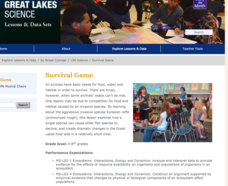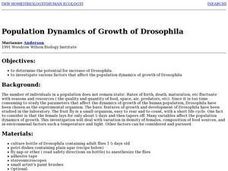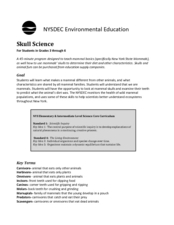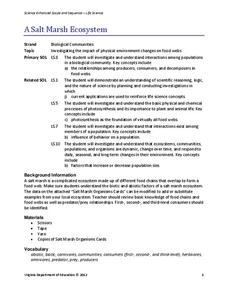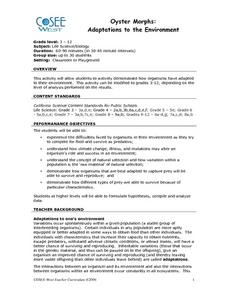Curated OER
Dare to Care for a Grizzly Bear
Students examine the relationship between humans and grizzly bears. In this biology lesson plan, students research about the bear's habits and living environment. They write a letter to the US Fish and Wildlife Service petitioning them...
Curated OER
Patterns of Evolution and Selection
Can your young biologists interpret population graphs, match macroevolution patterns and descriptions, and answer multiple choice questions about evolution? Find out with a comprehensive three-page quiz covering some specific examples of...
Michigan Sea Grant
Survival Game
Musical chairs may be a classic game, but Ruffe Musical Chairs is a unique lesson on invasive species! Using the time-honored game, pupils role play the behaviors of the invasive fish called Eurasian ruffe. Learning about this aggressive...
Curated OER
Population Dynamics of Growth of Drosophila
Students experiment with Drosophila to determine if density of female flies, food sources, temperature and light affect the population dynamics of growth. Students graph their data and compare their results to the number of human...
Wordpress
Darwin’s Natural Selection Case Studies
This editable worksheet is set up so that biology pupils read four case studies and identify points that are present in each, such as overproduction, heritable variation, struggle to survive, and differential reproduction. They also...
Curated OER
A Simple Model for Natural Selection
Do you have what it takes to survive as a fit predator or will elusive prey lead to your extinction? Find out in a creative natural selection activity. Using different colors and shapes of grains to represent different species and...
It's About Time
Natural Selection
Are you the predator or the prey? Student groups participate in an activity to demonstrate the process of natural selection in a contained environment. After scholars complete the activity and questions, they apply their knowledge...
ARKive
Darwin and Natural Selection
A presentation on Darwin's theory of evolution and natural selection could be a good addition to your biology class. It provides general information about how animals adapt to their surroundings, as well as how organisms create more...
University of Kentucky
The Great Spider Debate
Poor, misunderstood spiders! They are feared, disrespected, and detested by many people, yet they do so many positive things. A great addition to any insect unit, learn about some of the more common spiders, while hopefully dispelling...
Curated OER
Hide and Survive: A Natural Selection Activity
Students explore the theory of natural selection given certain scenarios. In this biology lesson, students graph data taken from the experiment. They explain the factors that contribute to the survival of the fittest.
Curated OER
Scavenger Hunt: Simulating Natural Selection
Young scholars simulate natural selection using pinto beans. In this biology lesson, students identify the factors affecting organism evolution. They record data from the experiment and formulate a conclusion.
Curated OER
Peppered Moth Simulation Activity
Students simulate peppered moth predators using SmartNotebook. In this life science lesson, students collect survival data and analyze results. They explain the importance of changes in species over time.
Curated OER
Biology: living Things and their Environment
Students recognize that organisms depend on other organisms. For this organism lesson, students understand symbiotic relationships and competition. Students explain food chains and food webs. Students understand that...
Curated OER
Role of Cerci in Escape Responses of the Cockroach
Students investigate the changes in escape behavior in Madagascar Hissing Cockroahes when their sensory apparatus is removed. They use puffs of air at differnt angles to simulate a predator's approach then collect and analyze data on...
Curated OER
Skull Science
What can your class learn from a skull? With proper facilitation, they can learn about diet, physical adaptations, special differences, and even the environment. Pupils will examine a series of mammal skulls and pelts to help them...
Curated OER
The Environment and Interactions of Living Organisms
Students study the environment and interactions of living organisms. They identify abiotic and biotic factors and create a foldable and vocabulary cards. They create a poster illustrating soil and watch a video to study symbiosis.
Curated OER
Rates and Causes of Mortality in Classroom and Wild Monarch Larvae
Students observe, record and analyze the mortality rates of the monarch larvae that are being held in a controlled environment versus those that are in the wild.
Virginia Department of Education
A Salt Marsh Ecosystem
What a web we weave. Pupils use yarn as the primary resource to create a web depicting the intricacies of a salt marsh ecosystem. They participate in a question and answer session, which leads to an in-depth facilitated discussion...
Curated OER
Native Species Restoration: Is Saving One Species Hurting Another?
Students investigate the effect of human activities upon the environment. The studying experience encourages students to think about the issues involved in native species restoration.
Virginia Department of Education
A Designed Organism
How can you encourage pupils to demonstrate creativity while still meeting the objective of applying technical knowledge? This activity is your answer! Scientists will create an imaginary creature and prepare a graphic organizer with...
Curated OER
Allele Frequencies and Sickle Cell Anemia Lab
Students investigate how selective forces like food, predation and diseases affect evolution. In this genetics lesson, students use red and white beans to simulate the effect of malaria on allele frequencies. They analyze data collected...
Curated OER
Oyster Morphs: Adaptations to the Environment
Students demonstrate how organisms adapt to their environment. They examine prey and predators, natural selection, and adaptations by representing oyster morph.
Curated OER
A Tail to Tell
Students observe populations of Lumbriculus to discover some of the adaptations that allow them to live successfully along the shores of ponds and marshes. They also design and perform experiments to test proposed hypotheses for these...
Curated OER
Why Care About Amphibian Population Decline and Malformations?
Students examine the reasons for preserving wildlife. They look at reasons for amphibian malformations and write an essay about the ethical issues that this brings up. They listen to the teacher read quotes about extinction and how the...




